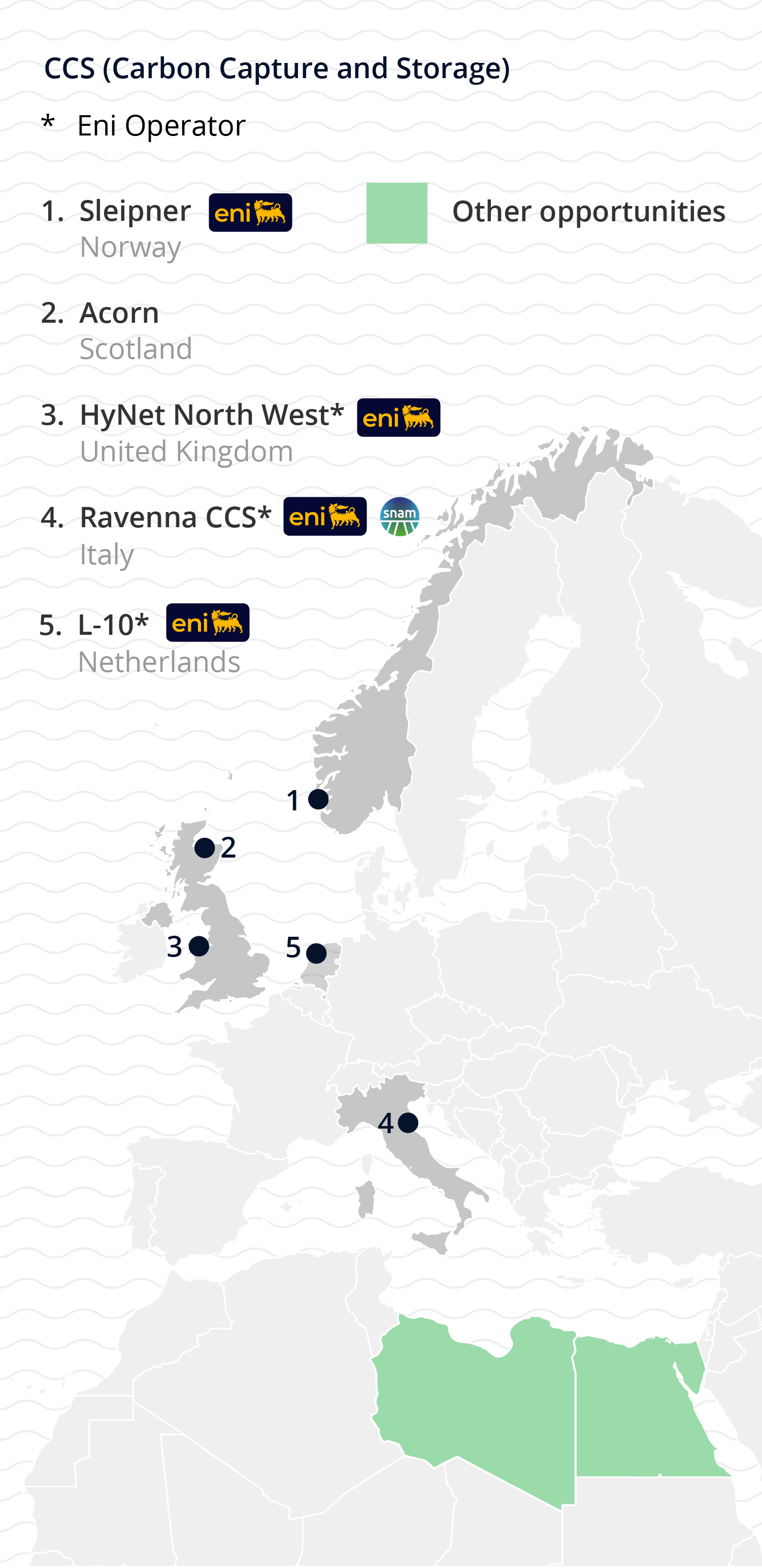
In addition to Ravenna CCS, Eni and Snam are involved in several international projects.

A key driver in the development of new CCUS projects is the emergence of the “CSS HUB” concept. In the past, storage projects were vertically integrated, with a capture unit closely linked to a dedicated transport system and a dedicated storage site. This system required large-scale projects to be financially viable, which often posed implementation challenges. More recently, there has been a shift towards separating the capture segment from the transport and storage facility, which can thus be shared by several capture facilities and different industrial players. This approach allows more modest capture projects to benefit from economies of scale and become competitive. CCUS Hubs are the linchpin that will enable the deployment of this key process, which is central to achieving carbon neutrality in new industrial contexts, overcoming previous constraints that have largely limited it to the oil sector due to economic and infrastructure-related reasons. The Ravenna CCS is a flagship initiative in the CCS field. The significant storage capacity of Eni's depleted reservoirs in the Adriatic Sea, amounting to 500 million tonnes, will make it the benchmark carbon capture and storage hub for Italy and the largest in Southern Europe. Eni is a partner in the Sleipner project in Norway, the first CCS initiative in Europe and the first in the world dedicated exclusively to permanent geological storage. Operating since 1996, it has injected over 20 million tonnes (Mtp) of carbon dioxide into a deep saline formation in the North Sea, demonstrating the technical and commercial viability of CCS.
In the United Kingdom, Eni is also involved in the integrated HyNet project in the North West of England as operator for CO2 transport and storage activities.
Start-up is scheduled for 2028, with an initial capture capacity of 4.5 Mtpa of CO2 and the possibility of expanding to 10 Mtpa beyond 2030.
Underscoring the robustness and strategic relevance of the initiative, in April 2025 the execution phase was launched following the achievement of the important milestone of financial closing with the UK authorities.
A similar result was achieved in September 2025 by two industrial partners involved in the project – a cement plant and a waste-to-energy plant – which will be the first facilities to move into the construction phase, with a total capture capacity of around 1.4 million tonnes of CO2 per year.
In the UK Eni also obtained the approval of the North Sea Transition Authority (NSTA) in August 2023 for a carbon dioxide storage licence for the depleted Hewett gas field in the southern British North Sea. Eni intends to develop a CCS project there, which will contribute to the decarbonization of the Bacton and Thames Estuary area, with a permanent CO2 storage capacity of around 330 million tonnes.
Finally, in the Netherlands, following the acquisition of Neptune, Eni is active on the CCS front as the operator of the L10 project. The project start-up is scheduled for the end of 2030, with CO2 injection gradually increasing to 5 Mtpa in the following years.
To accelerate the development of its CCS projects, Eni has set up a dedicated company in the United Kingdom named Eni CCUS Holding.
The company brings together all of Eni’s global activities in the carbon capture, utilization and storage (CCUS) sector and is based on a distinctive model founded on three factors: the availability of depleted reservoirs, the reuse of existing infrastructure and proximity to industrial clusters.
Snam is playing a major role in Europe's energy transition. In addition to participating in projects for the transport of green hydrogen produced in North Africa and its distribution in Europe, the company operates in the UK and Ireland both with its own projects and as shareholder of Storegga and dCarbonX, in which it holds a 50% interest. Storegga, a world leader in CCS, has been awarded one of the two CCS clusters (Scottish Cluster, Acorn Project) in the second round of support by the UK government. It has currently developed a first phase of CO2 storage for the Acorn project of around 5 Mtpa, with the potential to scale up to 0.5 Btpa in a deep saline aquifer. In addition, together with partners Sval and Neptune Energy, it has been awarded a licence to develop Trudvang CCS in the Norwegian North Sea. dCarbonX, a global leader in energy transition-related exploration and multi-molecule storage, was recently awarded a licence by the UK government to store natural gas and hydrogen in the west of England. Snam is an active participant in this project, which is expected to become operational by the end of 2027. In Ireland, efforts are focused on assessing the technical and commercial feasibility of multi-molecule storage projects. Snam is also developing innovative technologies to capture and use CO2 from industrial processes, both in hard-to-abate sectors and in carbon removal.

Eni and Snam are developing a carbon capture and storage (CCS) project to reduce emissions from “hard to abate” industrial facilities.
Eni and Snam are developing a carbon capture and storage (CCS) project to reduce emissions from “hard to abate” industrial facilities.